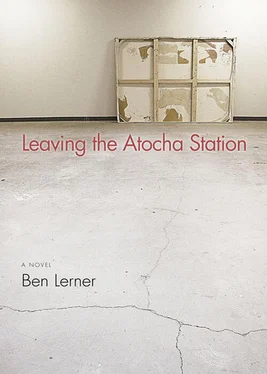When it was unmistakably night we walked down toward and then along the Darro; there was some sort of small festival and part of the river was illumined by torches. Little kids dressed in white, glowing softly, darted through the streets. It had been a while since either of us had spoken, and whereas for months I had imagined Isabel’s silences as devoted to me entirely, I was now unsure if I was even in her thoughts.
“When I am near a river,” I heard myself say, “I think of my time in Mexico.”
“When were you in Mexico?” she asked.
“I spent some time with my girlfriend in a town called Xalapa before I came to Spain.” I paused to suggest she might still be my girlfriend. “We went on a trip one weekend. We found a place to swim. There was a violent current, but we decided to swim anyway. There was another man. He wanted his girlfriend to swim. But she was afraid of the current. In the end she entered the river.” I paused again, lighting a cigarette. Why was my Spanish so halting? “She did not know how to swim. She had bad luck and the current carried her. We followed her. We found her body in the river. I gave her”— here I touched my mouth and then gestured toward Isabel’s—“to make her breathe. But it was too late. We took her body to a place with phones. We called the police. An old woman gave us limes.”
“Limes,” Isabel confirmed.
“She gave us limes for sucking because we suffered shock.”
“My God,” Isabel said, and took my hand. I wanted her to ask about my girlfriend, I was preparing a speech about Jane, but she didn’t. We sat down on the low stone wall that ran along the river and watched the reflections of the torches in the water and after a while Isabel began to talk. First she described a house or home or apartment, a description vaguely familiar from her first speech at the lake, but I was still unsure if her words attached to a household or the literal structure where she lived. I could understand more now than then; my Spanish had, despite myself, significantly improved, but this fact itself got in the way of understanding: I was measuring the time that had elapsed since the night at the lake by virtue of my increased comprehension, but this attention to the quality of my own attention crowded out Isabel’s meaning. Eventually I shook free of my self — absorption and came to grasp what she was saying, aided by how slowly she was speaking. That summer her brother died — she referred to his death as if we’d discussed it before — and she was looking through his stuff, records and books, deciding what to take with her when the family moved, she had found a notebook, a notebook from school, what grade she wasn’t sure, and it had numbers written all over its pages: 1066, 312, 1936, 1492, 800, 1776, etc. At first she didn’t know what these were, didn’t recognize them as years, significant years he probably had to memorize for a history test, and so had written the numbers again and again, filling an entire notebook with them, and she convinced herself that it was an elaborate coded message, a message to her. She must have known, she was sixteen, that this was impossible, but she had let herself be convinced, and the notebook became her most treasured possession. She never attempted to decipher the code, the point was not to read the message; the point was that there was an ongoing conversation between her and her brother, an unconcluded correspondence. A few months before Oscar left for Barcelona he found the notebook, which Isabel had never mentioned to anybody, although she hadn’t really hidden it either, keeping it in a box with various childhood possessions on the top shelf of her closet. It suddenly occurred to me that we never went to Isabel’s apartment not only because my apartment had more privacy but also because she probably wanted to keep me away from her roommates and/or reserve her bed for Oscar exclusively. Oscar asked why she had this notebook with years written all over it and this was the first time she let herself realize they were in fact just years. She was furious at Oscar for destroying her fantasy and screamed at him and then burst into tears and then told him the whole story and cried and cried as though only then, many years after the accident, did she fully confront the reality of her brother’s death. They sat on the bed together carefully turning the pages and Isabel wept and ran her fingers over the years, which were written in blue and red.
Later, when Oscar and Isabel broke up or at least agreed to see other people because he was leaving for Barcelona, Isabel had fallen apart, and had somehow felt her brother’s death was upon her again, because Oscar was the only person she talked to about her brother, and because of the scene they shared with the notebook. One thing she loved about me, she said, and it was clear she meant “loved” in the weakest sense, was that I never asked her questions about her brother after she talked to me about him at the lake.
I said nothing. After a while we resumed our walk and wandered back up into the Albaicín and found our hotel. It was a steep walk and we were tired by the time we arrived. There were a few tables in the courtyard and I asked the teenager who was sweeping up if it was possible to have wine. He brought us a warm, unlabeled bottle of white wine and two tall glasses filled with ice. We drank and smoked until the bottle was empty and then went to our room and fucked quickly and I felt completely in love. Isabel went to sleep and I opened the tall wooden shutters and leaned out overlooking the street and smoked. There were no cars parked on the street and it was perfectly quiet and I thought it probably looked like this in 1066, 312, 1936, whatever. Then I thought it probably didn’t, got in bed, and fell asleep.
The next morning we had breakfast at the same café and I said to Isabel that the more I thought about it the more eager I was to get back as I had to work with someone named Teresa on a pamphlet of my poetry that was to be published. I said this as if I were nervous about saying anything regarding Teresa in front of Isabel, nervous I might hurt her feelings.
“We can take the train tonight,” Isabel said, and because she didn’t seem jealous I was furious.
“Let’s just go back now,” I said, which was ridiculous.
“Now? You haven’t seen the Alhambra,” she said.
“I’ve seen it before,” I lied. Now she looked jealous. I was elated.
“With whom?” she asked, and it was clear she was only pretending not to care.
“Teresa,” I said, and then pretended I wished I hadn’t. “And her brother.”
“When?” she asked.
“Around Christmas,” I said. I had the sense that Isabel wanted to be my only guide, that while she didn’t care who I slept with, she didn’t want another woman showing me the architectural wonders of Spain.
“But you said you wanted to see Granada — that’s why we came,” she said, remembering our conversation in bed.
“I did want to see it again,” I said. “And I’ll come back again.”
“Fine,” she said, angry. I wondered if I would be the only American in history who visited Granada without seeing the Alhambra.
After breakfast we took a cab to the train station, bought our tickets, and had around an hour and a half to kill before the Talgo left. It wasn’t until we actually bought our tickets that I realized the last thing I wanted to do was to go back. We found a café and ordered more coffee and the caffeine along with Isabel’s jealousy inspired me to say, “Look, when we get back to Madrid, let’s just stay one night. I can get my work done and we can pack for a longer trip. Then we can take another train to Galicia or Lisbon or wherever.”
Isabel smiled at me, having gone at an alarming rate from anger to something more like pity. “I can’t,” she said. “I have to work.”
Читать дальше












